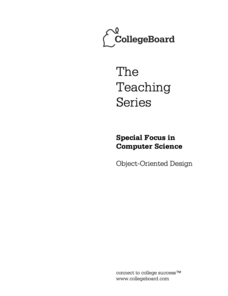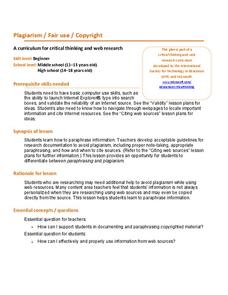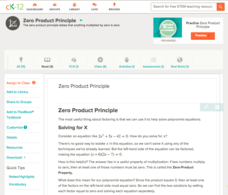Curated OER
Computer Basics
Students review basic terminology that they would use to reference computers in media arts. In this computer terminology lesson plan, students use terms frequently.
College Board
Object-Oriented Design
Just jump in with both feet. To better teach Java, one must think Java. The College Board built document immerses teachers in object-oriented design by providing several resources for use. Resources include teaching strategies, design...
Microsoft
Plagiarism Fair Use Copyright
Nothing makes junior high and high school teachers more frustrated than plagiarism. Instruct young writers about copyright laws and the correct ways to paragraph information without copying the exact words. A set of secondary-level...
Code.org
Controlling Memory with Variables
Not all variables are created equal. Discover how variables in computer science are different from variables in math class. Scholars learn to work with variables in computer programming by developing a mental model for how variables...
California Department of Education
An Online Tool I Can Use
Tools for school—and beyond! Introduce your sixth graders to online tools to plan their academic and professional futures. The fifth and final lesson in a series of career and college readiness activities focuses on a scavenger hunt to...
Curated OER
How Computers Work Scavenger Hunt
In this computers worksheet, learners utilize the Internet to access one specific website to solve the answers to five short answer questions involving how computers work.
Curated OER
The Hot Dog Stand
Students run a computer simulation. They collect data as they work and use the data to create an annual report for their business. Several different simulations could be used for this project. It is desirable for students to do this...
SurfScore
Kodable
Prepare young scholars for life in the twenty-first century with this introduction to computer coding formatted as a fun problem solving game, this resource is a great way to develop children's sequential thinking...
Code.org
Star Wars: Building a Galaxy with Code
Welcome to the code side. The interactive lesson introduces coding in a game format with familiar characters. Young computer experts learn to develop code to control the interaction of the characters in the game. The activity ends with...
Curated OER
Introduction to Computers and Computer Vocabulary
Students explore computer work stations and computer commands. They complete a computer skills assessment inventory, identify parts of computers using vocabulary and commands, and write the names of parts of the computers. They place the...
College Board
Using the Java Collections Hierarchy
Collect a set of collections. Professional development material provides teachers with information about collections that are in AP Computer Science. Materials include teaching strategies, sample labs, and worksheets. Educators use the...
Institute of Electrical and Electronics Engineers
Arduino Blink Challenge
Emerging engineers read about Arduino software and how it can be used. Then they follow a nine-step tutorial to connect an Arduino board to a computer and put it to work! The objective is to code a program that will cause an LED to...
Council for Economic Education
The Economics of Income: If You’re So Smart, Why Aren't You Rich?
If basketball players make more than teachers, why shouldn't learners all aspire to play in the NBA? Unraveling the cost and benefits of education and future economic success can be tricky. Economic data, real-life cases, and some...
Curated OER
Go for the Gold!
The options are vast with this Ancient Greece and Olympics research project! Using Scholastic online resources, historians have interactive and educational supports to guide them through researching and writing about the 2004 Olympics in...
Positively Autism
"When I Feel Angry" Social Skill Story
Here's a presentation that shows kids appropriate ways to behave when they are feeling angry. They learn how to identify when they are feeling angry, calming strategies they can use, and words they can use to express their anger. The...
University of Minnesota
Mirroring Emotions
Do you ever give your class the "teacher look"? Without saying a word, they become silent and engaged (hopefully). How do they know what you're thinking? Explore the concept of nonverbal communication and how it relates to our...
CK-12 Foundation
Zero Product Principle
Some lessons feature videos, some interactive practice problems, and some have notes and activities. This comprehensive look at factoring and solving polynomial equations using the zero product principle has all of this and more. Though...
College Board
Advanced Object-Oriented Concepts
Advance inheritance in the classroom. The resource is a professional development module with sections great to use in the classroom. Sections cover ideas of inheritance in Java along with abstract classes. Each section includes a...
Computer Science Unplugged
The Intelligent Piece of Paper
How smart is that piece of paper? The activity introduces the idea of computer programming as a list of instructions written by computer programmers. Two individuals play a game of Tic-Tac-Toe in which one follows the commands...
Beauty and Joy of Computing
Building Your Own Blocks
Isn't building with blocks an activity for toddlers? The third lab of a five-part unit teaches young computer scientists how to create their own block instructions for programming. They use these blocks to create geometric figures, spell...
NPR
Chinese American Women Lesson Plan
The National Women's History Museum provides a plan designed to accompany their online CyberExhibit, Chinese American Women; a History of Resilience and Resistance. After examining a series of primary and secondary source documents,...
Curated OER
All About Computers
Students discover facts about computers. In this technology lesson, students find out how to locate information on the Internet. Students choose a topic to research and search several sites for information.
Curated OER
Invention: Computer Technology
Students comprehend that inventions can change the way we live. They comprehend that many inventions start out with design flaws and are refined later by subsequent inventors and designers. Students are explained that the computer, was...
Curated OER
Know Your Computer Hardware #103
Young scholars discover the different terms and parts of a computer's body. In this computer basics lesson, students become familiar with the parts of the computer, starting in kindergarten and increasing their knowledge through...

























